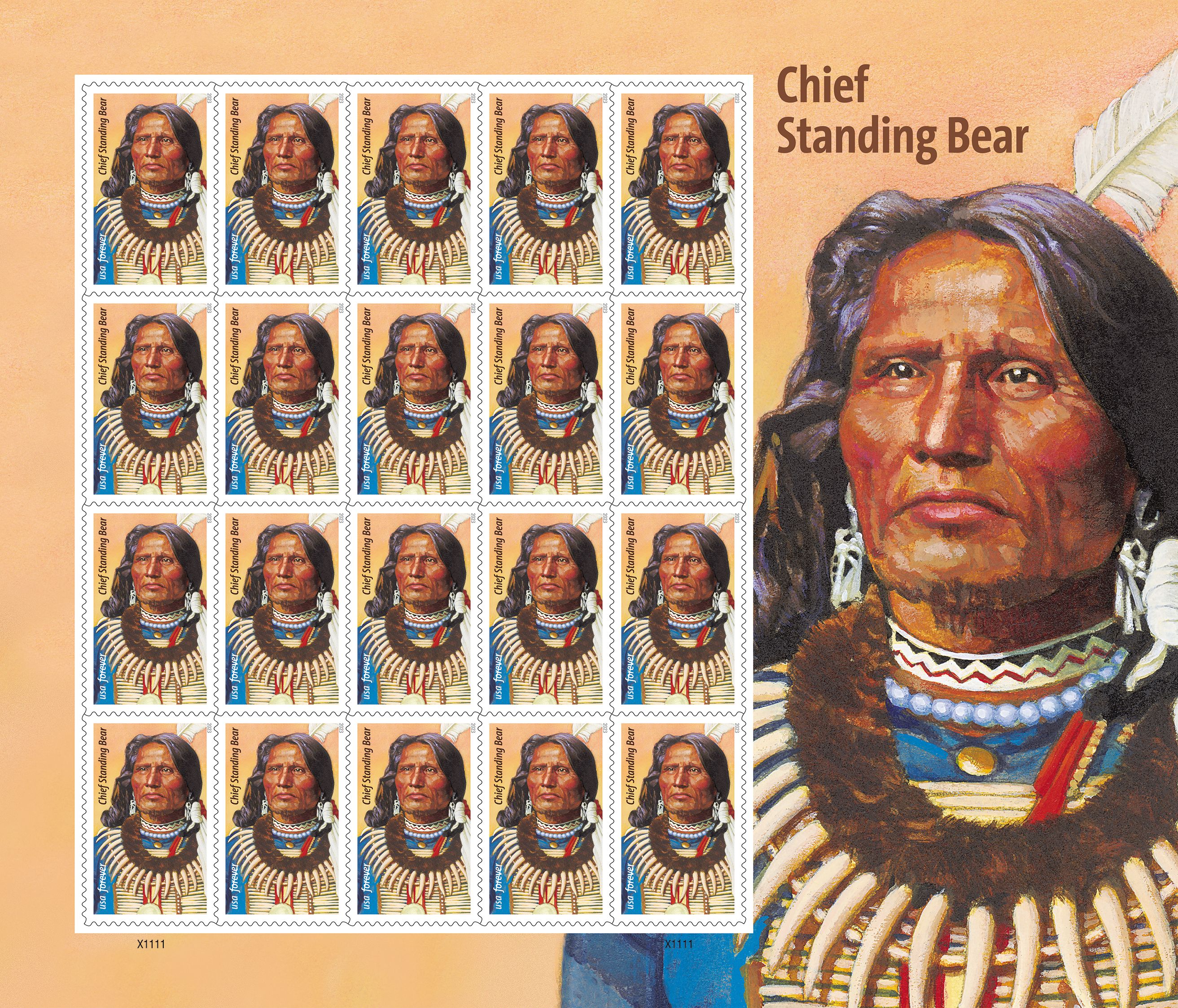
- Details
- By Native News Online Staff
The United States Postal Service (USPS) released on Friday 18 million stamps honoring legendary Chief Standing Bear, a Ponca tribal leader who championed Native American 14th Amendment rights.
This stamp features a portrait of Chief Standing Bear by illustrator Thomas Blackshear II. Blackshear created the portrait based on a photograph taken of Standing Bear in 1877 while he was in Washington, DC, as part of a delegation of Ponca chiefs appealing to government officials for the right to return to their homeland. Art director Derry Noyes designed the stamp.
Chief Standing Bear became famous for his resistance to the U.S. government’s forced relocation of the Ponca people to Indian Territory to what is now known as the state of Oklahoma.
The resistance came in a lawsuit that began when in 1877, the U.S. Army had forcibly relocated some 700 Ponca to Indian Territory (what is now Oklahoma) after the federal government had given away the tribe’s homeland in the Niobrara River Valley in what is now northeastern Nebraska.
In a landmark civil rights case, Standing Bear v. Crook, Standing Bear sued the government for his freedom after being arrested, along with 29 other Ponca, for attempting to return to his homeland. Lawyers filed a writ of habeas corpus to test the legality of the detention, an unprecedented action on behalf of a Native American.
After winning the case, Standing Bear and the members of the Ponca who had followed him were allowed to return to their old Nebraska reservation along the Niobrara River.
One issue that his 1879 trial had raised was finally resolved in 1924 when Congress adopted the Indian Citizenship Act, which conferred citizenship on all Native Americans born in the United States.
Customers may purchase stamps and other philatelic products through the Postal Store at usps.com/shopstamps, by calling 844-737-7826, by mail through USA Philatelic or at Post Office locations nationwide.
More Stories Like This
Native News Weekly (August 25, 2024): D.C. BriefsUS Presidents in Their Own Words Concerning American Indians
Oral History Project Announces 14th Stop in Portland, Oregon: NABS Continues to Gather Crucial Stories Across Indian Country
Tunica-Biloxi Tribe Acquires GovStrive, Expanding Presence in Federal Workforce Solutions
Small-Dollar Donors Fuel Deb Haaland’s Historic Campaign for New Mexico Governor
Help us tell the stories that could save Native languages and food traditions
At a critical moment for Indian Country, Native News Online is embarking on our most ambitious reporting project yet: "Cultivating Culture," a three-year investigation into two forces shaping Native community survival—food sovereignty and language revitalization.
The devastating impact of COVID-19 accelerated the loss of Native elders and with them, irreplaceable cultural knowledge. Yet across tribal communities, innovative leaders are fighting back, reclaiming traditional food systems and breathing new life into Native languages. These aren't just cultural preservation efforts—they're powerful pathways to community health, healing, and resilience.
Our dedicated reporting team will spend three years documenting these stories through on-the-ground reporting in 18 tribal communities, producing over 200 in-depth stories, 18 podcast episodes, and multimedia content that amplifies Indigenous voices. We'll show policymakers, funders, and allies how cultural restoration directly impacts physical and mental wellness while celebrating successful models of sovereignty and self-determination.
This isn't corporate media parachuting into Indian Country for a quick story. This is sustained, relationship-based journalism by Native reporters who understand these communities. It's "Warrior Journalism"—fearless reporting that serves the 5.5 million readers who depend on us for news that mainstream media often ignores.
We need your help right now. While we've secured partial funding, we're still $450,000 short of our three-year budget. Our immediate goal is $25,000 this month to keep this critical work moving forward—funding reporter salaries, travel to remote communities, photography, and the deep reporting these stories deserve.
Every dollar directly supports Indigenous journalists telling Indigenous stories. Whether it's $5 or $50, your contribution ensures these vital narratives of resilience, innovation, and hope don't disappear into silence.
 The stakes couldn't be higher. Native languages are being lost at an alarming rate. Food insecurity plagues many tribal communities. But solutions are emerging, and these stories need to be told.
The stakes couldn't be higher. Native languages are being lost at an alarming rate. Food insecurity plagues many tribal communities. But solutions are emerging, and these stories need to be told.
Support independent Native journalism. Fund the stories that matter.
Levi Rickert (Potawatomi), Editor & Publisher

